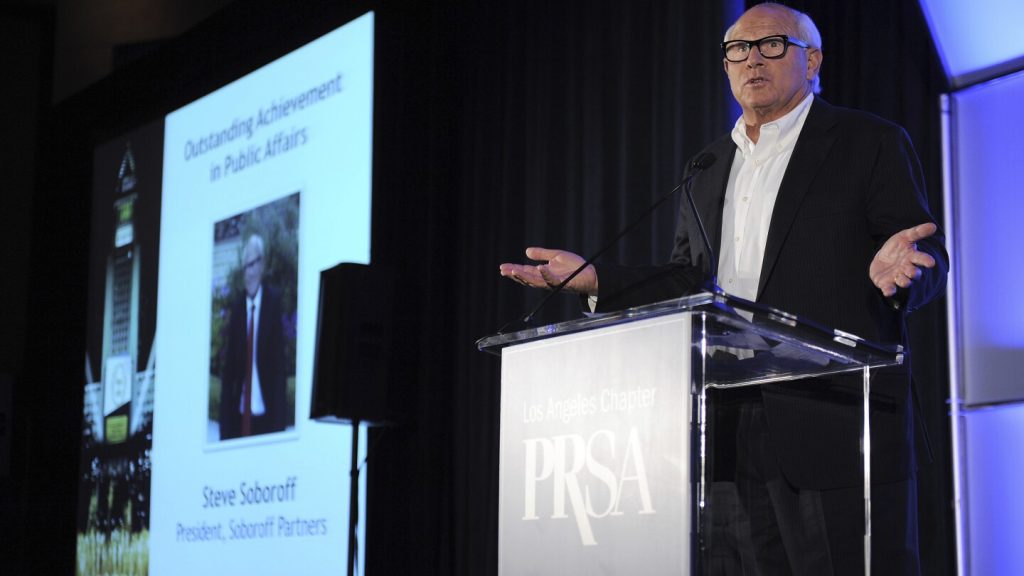1. Introduction: Soboroff’s Role and the Salary Controversy
Steve Soboroff, a prominent figure in Los Angeles civic life, was appointed as the city’s chief recovery officer to oversee the aftermath of devastating wildfires. Initially, his three-month role was set to come with a $500,000 salary, sourced from charitable donations rather than taxpayer funds. However, this proposal sparked significant backlash, leading Mayor Karen Bass to reverse the decision, resulting in Soboroff agreeing to work without pay. Soboroff, known for his extensive experience as a residential property developer, defended the salary, emphasizing his expertise. Yet, amid growing criticism from both officials and residents, Bass and Soboroff reached a mutual decision to forgo compensation, ensuring the recovery efforts remain the focus without financial distractions.
2. Background: Soboroff’s Civic Contributions
Soboroff’s dedication to Los Angeles is well-documented, with decades of civic involvement. He has served on the city’s Board of Police Commissioners and the Department of Recreation and Parks commission, both in volunteer capacities. His professional background in real estate development, coupled with environmental consulting, positions him as a seasoned expert. Soboroff’s commitment to civic projects has often been unpaid, showcasing his deep-rooted dedication to the city’s well-being. His recent role required him to pause other professional engagements, underscoring the significance he places on recovery efforts.
3. The Reversal Decision: Mayor Bass and Public Reaction
Mayor Karen Bass played a pivotal role in addressing the salary controversy, announcing that Soboroff would work pro bono. Bass stated that Soboroff’s dedication to Los Angeles was unwavering, and his commitment to the city’s recovery was paramount. The decision was made to prevent any distractions, ensuring the focus remained on rebuilding efforts. Soboroff’s willingness to forgo his salary highlighted his resolve, aligning with the community’s expectations and fostering trust.
4. Scope of Work and Adjustments
Initially tasked with leading the recovery efforts, Soboroff’s role involved coordinating with various sectors to rebuild affected areas. However, there were discussions about narrowing his focus to the historic business district of Pacific Palisades. Soboroff clarified that his involvement extended beyond local efforts, including interactions with federal agencies, indicating that his role remained comprehensive. This adjustment reflected the evolving needs of the recovery process, with Soboroff’s expertise continuing to play a crucial role.
5. Soboroff’s Perspective and Sacrifices
Soboroff’s personal connection to the affected area adds depth to his involvement. As a resident of Pacific Palisades, where his family home was among those destroyed, and with his son Jacob, an NBC News journalist, reporting from the devastated neighborhood, Soboroff’s commitment is deeply personal. He has consistently contributed to civic projects without compensation, but this role required him to pause other professional commitments. Soboroff underscored that his salary would not burden taxpayers or wildfire survivors, though the specific charitable sources remained unclear. City Councilmember Monica Rodriguez termed the proposed salary "obscene," reflecting broader public sentiment that influenced the decision.
6. Conclusion: Moving Forward
The resolution to the salary controversy has allowed the focus to return to recovery efforts, with Soboroff’s dedication remaining steadfast. His willingness to work without pay demonstrates his commitment to Los Angeles’s rebuilding, emphasizing the importance of unity in these efforts. As the city moves forward, Soboroff’s leadership and the community’s resilience are set to pave the way for reconstruction and renewal, ensuring a brighter future for all Angelenos.












